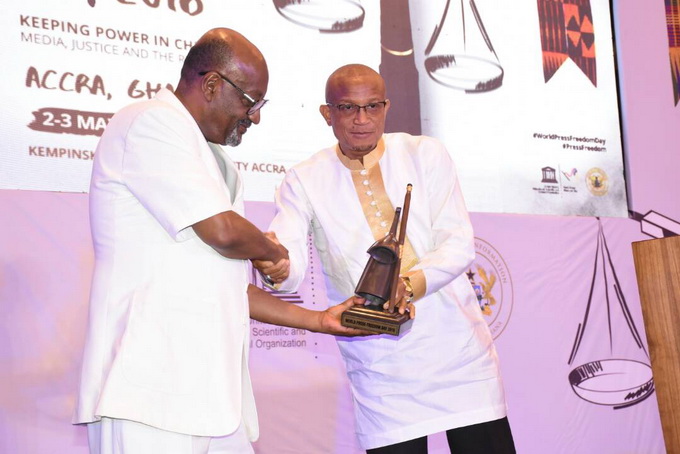
Accra Declaration...Fight crimes against journalists as world marks World Press Freedom Day
This year’s celebration of World Press Freedom Day ended in Accra on Thursday with a charge to all countries to put in place robust legal regimes and policy frameworks to promote press freedom and fight crimes against journalists.
In what has come to be known as the Accra Declaration, the 900 participants, drawn from 200 organisations across 90 countries, called for an independent media that would not be subjected to any form of influence by government.
Advertisement
Among other things, the Accra Declaration underscored the need for countries to review cases of journalists who were in prison for their work, with a view to releasing anyone whose prosecution was not constitutional and inconsistent with international standards.
Apart from the mandate placed on the state to protect journalists from all forms of harm, the declaration also charged the United Nations Educational, Scientific and Cultural Organisation (UNESCO), journalists and media organisations, civil society organisations CSOs) and other stakeholders to play their role appropriately to strategically position the media to play their role in promoting democratic governance.
The document charged journalists to be responsible in the dissemination of credible and accurate information, especially in the wake of increasing penetration of social media platforms, where all manner of information was churned out without verification.
It further charged owners of media organisations to put in place safety mechanisms at their workplaces and provide journalists with safety tools to reduce their vulnerability in the line of duty.
For the CSOs and academia, the Accra Declaration charged them to support research and monitoring efforts in the area of safety for journalists with a view to ensuring that accurate information about threats, risks and attacks was provided to the relevant authorities for swift action to be taken.
The declaration also urged UNESCO to continue to provide the right leadership on the United Nations (UN) plan of action on the safety of journalists and the issue of impunity on the media front.
It further called on UNESCO to support the training and capacity building of journalists in the area of digital safety and security, including the use of open and other technologies.
Adoption
The Deputy Director-General of UNESCO, Mr Getachew Engida, who led the way for the adoption of the draft declaration at the closing session of the historic event underscored the need for pragmatic steps to be taken to remove all barriers to media freedom across the world.
“What the world is adopting in Accra here today is a wonderful document that will lead our way as we seek freedom of expression for media practitioners; so by the acceptance of the declaration, we speak against all forms of crimes against journalists and ask for justice to be done to all victims across the world,” he added.
He lauded President Nana Addo Dankwa Akufo-Addo and other stakeholders for their support for the Ghanaian media and asked for more to be done to make the media landscape more liberal.
Commitment
For his part, the Minister of Information, Dr Mustapha Abdul-Hamid, observed that the hosting of the world event in Ghana showed that the country’s media was a vibrant one and a shining example for most countries.
“Ghana prides herself as the most democratic country in Africa so the onus lies on us to strengthen our media systems to empower our journalists to be able to operate in a manner that will deepen our democratic governance processes,” he said.
He reiterated the government’s commitment to passing the Right to Information (RTI) Bill which, he said, held the key to ready access to reliable and relevant information for the media.
To symbolise the official closure of the two-day event, Dr Abdul-Hamid handed over a ‘gong-gong’ to the Deputy Director-General of UNESCO, Mr Engida.




